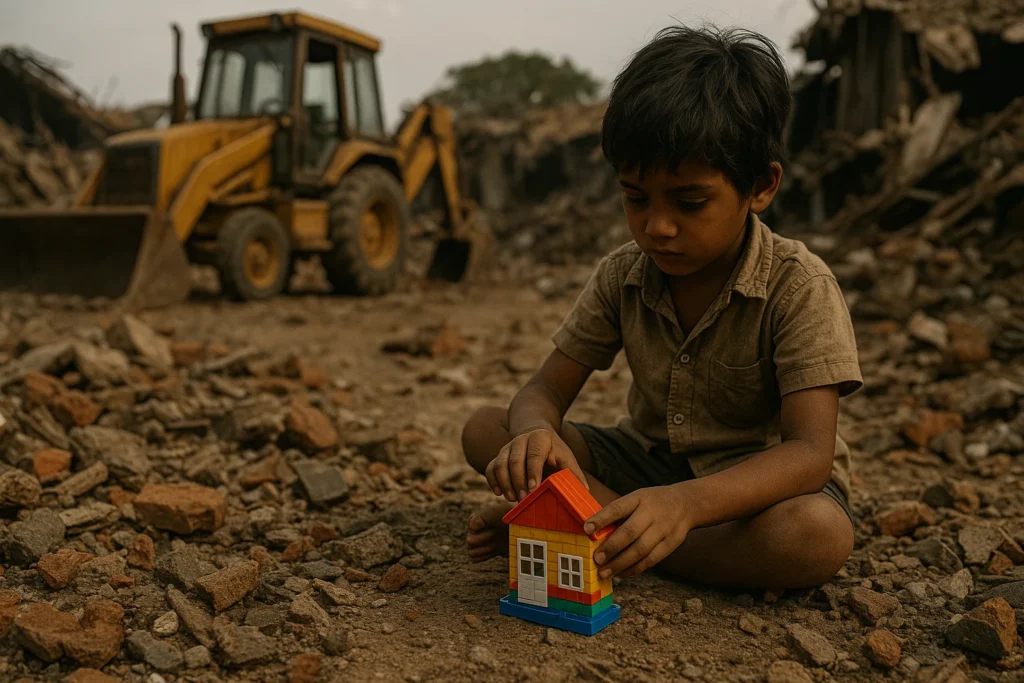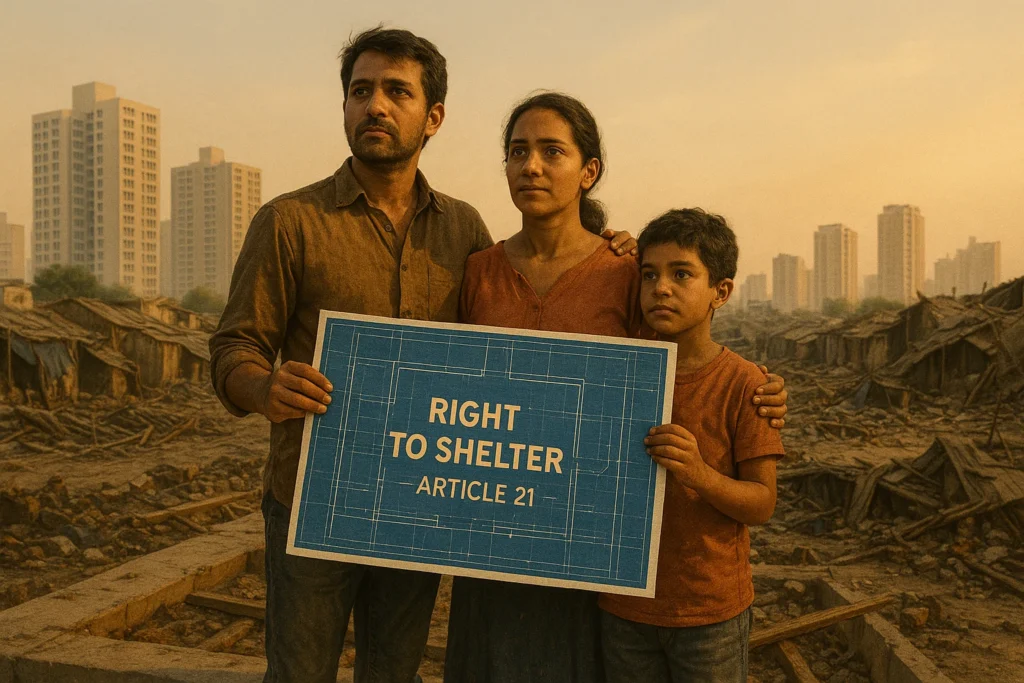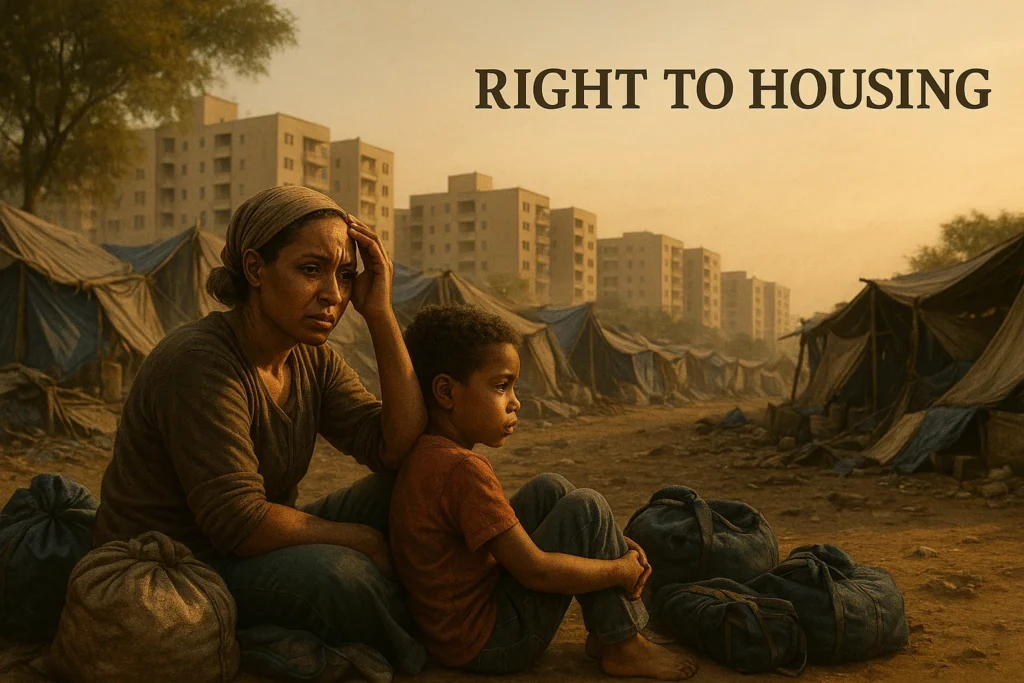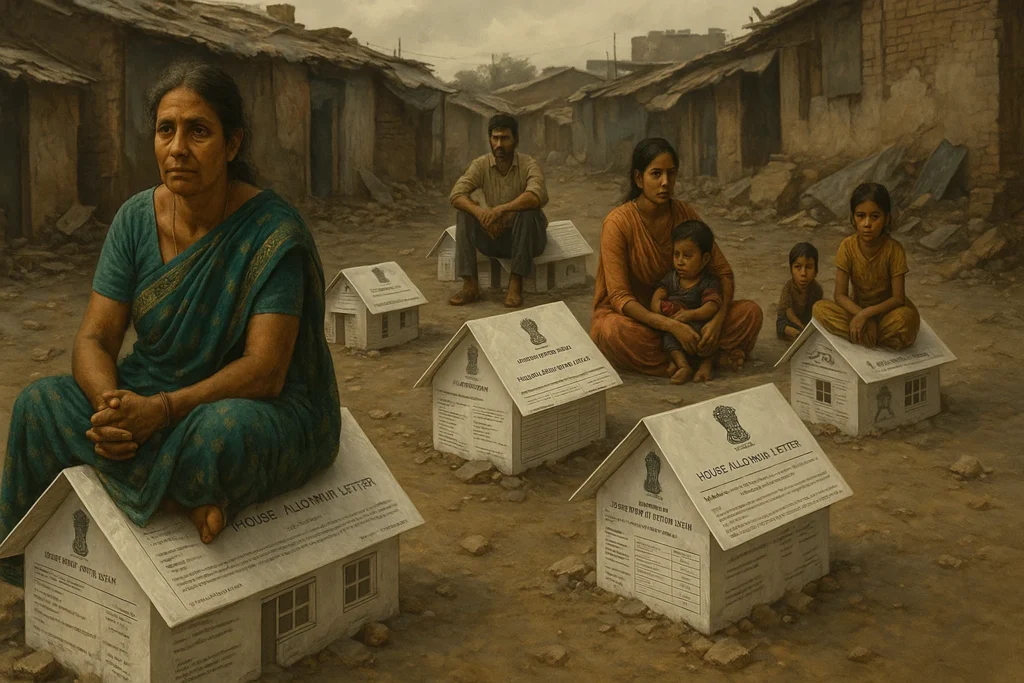Introduction
The 2019 Delhi High Court judgment in Ajay Maken vs Union of India is a transformative moment for urban housing rights in India. This case, rooted in the demolition of the Shakur Basti slum cluster, fundamentally reshaped the legal landscape for slum dwellers by affirming their constitutional protections against forced and unannounced evictions. Through a detailed analysis of the facts, legal arguments, and judicial reasoning, this blog explores why Ajay Maken vs Union of India is now a cornerstone for the right to shelter and dignity in Indian cities.
Table of Contents
Background: The Shakur Basti Demolition and Legal Challenge
In December 2015, the Indian Railways demolished over 1,200 jhuggis (slum dwellings) in Shakur Basti, Delhi, displacing thousands of families overnight. The demolition, which occurred without prior notice or rehabilitation, led to tragic consequences, including the death of a child. This prompted Ajay Maken, a senior Congress leader, and others to file a Public Interest Litigation (PIL) before the Delhi High Court, challenging the legality and constitutionality of the eviction.

The petitioners in Ajay Maken vs Union of India argued that the demolition violated established legal norms, including the right to life under Article 21, and ignored previous judicial mandates requiring surveys and rehabilitation before any eviction. The case quickly became a focal point for debates on urban poverty, state responsibility, and the rights of the marginalized.
The Issues Before the Court
The central questions in Ajay Maken vs Union of India included:
- Whether slum dwellers could be evicted without a prior survey and consultation.
- Whether the authorities were obligated to provide rehabilitation before demolition.
- Whether slum dwellers should be treated as encroachers or as citizens entitled to constitutional protections.
The Court’s Analysis: Right to Housing and Due Process
The Right to Housing as a Constitutional Guarantee
In Ajay Maken vs Union of India, the Delhi High Court held that the right to housing is an essential component of the right to life and dignity under Article 21. Drawing from international law, including General Comments 4 and 7 of the UN Committee on Economic, Social and Cultural Rights, the Court underscored that forced evictions without due process and rehabilitation are fundamentally incompatible with human rights standards.
The Court’s reasoning was clear: slum dwellers are not mere encroachers but citizens who contribute to the city’s economy and social fabric. Their lack of adequate housing is a failure of the state, not a personal shortcoming. As such, their rights must be protected, not trampled.

The Mandate for Survey and Consultation
A pivotal holding in this judgement was that no eviction could be carried out without first conducting a proper survey of the affected population and consulting with them about their needs and entitlements. The Court required authorities to act in coordination to ensure that immediate relief and rehabilitation were provided to the displaced.
This protocol was not merely procedural. It was designed to ensure that the most vulnerable were not rendered homeless overnight and that their voices were heard in decisions affecting their lives.
Rehabilitation as a Precondition for Eviction
The Court in Ajay Maken vs Union of India made it unequivocally clear: no eligible resident could be evicted before being provided with adequate rehabilitation. This directive was rooted in both domestic law and international human rights obligations, reinforcing the principle that development cannot come at the cost of basic human dignity.

The “Right to the City” and Urban Citizenship
One of the most innovative aspects of Ajay Maken vs Union of India was its invocation of the “Right to the City.” The Court recognized that urban residents, including slum dwellers, have a right to participate in the city’s growth and to claim a share in its resources and opportunities. This right is not just about physical shelter but about inclusion, participation, and justice in urban governance.
By framing the right to housing within the broader “Right to the City,” the judgment marked a departure from earlier jurisprudence that often treated slum dwellers as obstacles to urban development. Instead, Ajay Maken vs Union of India positioned them as stakeholders whose rights and contributions must be acknowledged.
Protocols and Continuing Mandamus
Following the initial orders, the Delhi High Court in Ajay Maken vs Union of India issued a series of interim directives to ensure compliance. The Delhi Urban Shelter Improvement Board (DUSIB) was made the nodal agency for conducting surveys, preparing lists of those affected, and handling complaints from displaced residents. The Court’s approach of “continuing mandamus” meant that it retained oversight over the implementation of its orders, ensuring that relief and rehabilitation were not just promised but delivered.
Interaction with Policy: DUSIB Policy 2015
The judgment in Ajay Maken vs Union of India interacted closely with the DUSIB Policy 2015, which set criteria for eligibility and procedures for rehabilitation of slum dwellers. The Court clarified that the policy applied to all clusters existing as of January 1, 2006, and that authorities could not arbitrarily deny benefits to eligible residents. However, the Court also acknowledged that encroachment on government land was not a fundamental right and that only those covered by the policy were entitled to rehabilitation.
This nuanced approach balanced the need for urban planning with the imperative of protecting vulnerable populations from arbitrary state action.
Judicial Reasoning: Human Problem, Not Just Legal Issue
The Delhi High Court, in Ajay Maken vs Union of India, emphasized that the issue was not merely legal but fundamentally human. The Court recognized the plight of families who would have “no place to go with their family and belongings if they are faced with mid-night eviction.” This empathetic reasoning reflected a broader judicial trend towards recognizing the lived realities of the urban poor.
Legacy and Impact of Ajay Maken vs Union of India
Strengthening Due Process
Ajay Maken vs Union of India has become a touchstone for due process in urban evictions. It established that authorities must follow a transparent, consultative, and humane process before displacing any community. The judgment has been cited in subsequent cases and has influenced policy debates on slum rehabilitation across India.
Shifting Judicial Attitudes
The case marked a clear shift in judicial attitudes. Whereas earlier judgments sometimes facilitated slum demolitions in the name of urban planning, Ajay Maken vs Union of India placed the rights of the poor at the center of the legal discourse. It broke away from the trend of treating slum dwellers as “encroachers” and instead recognized their rights as urban citizens.
Policy and Practice
The protocols established in Ajay Maken vs Union of India have informed the practices of agencies like DUSIB and have been referenced in government guidelines for slum rehabilitation. The case has also empowered civil society organizations to demand accountability and transparency in urban development projects.
Critiques and Continuing Challenges
Despite the advances made in Ajay Maken vs Union of India, challenges remain. Subsequent judgments have clarified that not all slum dwellers are automatically entitled to rehabilitation, especially if they do not meet policy criteria. There are ongoing debates about the scope of the right to housing and the extent of state obligations. The Supreme Court has not stayed the judgment but has sought solutions to the “human problem” posed by mass evictions. This same judgement comes every time under Question in case of Bulldozer justice.

Ajay Maken vs Union of India is a landmark in the ongoing struggle for urban justice in India. By affirming the right to housing, mandating due process, and recognizing the humanity of slum dwellers, the judgment has set a new standard for state accountability and the protection of vulnerable communities. As Indian cities continue to grow and change, the principles laid down in this case will remain vital for ensuring that development does not come at the cost of dignity and inclusion.
[…] of the CaseThe case of Ajay Maken vs Union of India concerned the demolition of slums in Shakur Basti, Delhi, where residents were evicted without […]